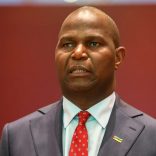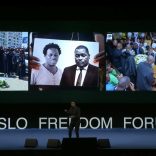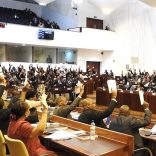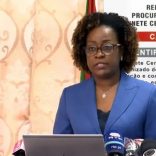Mozambique: President begins working visit to Inhambane province
Mozambique Elections | Frelimo stalwart Hélder Martins: ‘Return the party to the people’ – Carta

Illustrative image: Carta de Moçambique
Former health minister Hélder Martins has once again broken his silence and, in an open letter addressed to the Frelimo leadership (specifically to the party president and secretary-general), expressed his outrage at the current political climate in the country, characterised by popular demonstrations called by presidential candidate Venâncio António Bila Mondlane, who claims victory in the October 9 elections.
In yet another letter in which he says “Enough!” and refuses “more complicity or cowardice”, Martins – as he did in February 2021, when he left the Covid-19 Technical Scientific Committee because he did not agree that it should be led by a politician – blames his party for the situation Mozambique finds itself in and considers the government’s [policing] approach a “political mistake”.
In an eight-page letter, entitled “To return the Frelimo party to the people”, the first health minister of independent Mozambique begins by reminding the party leadership that he is one of the 300 militants who founded the movement that led the national liberation struggle (the Mozambique Liberation Front, now transformed into a political party), and one of just five who are still alive.
Originally from Udenamo (National Democratic Union of Mozambique), one of the groups that came together to create Frelimo, 81-year-old Hélder Martins expresses in the letter his concern about the current social, economic and political situation of the country, confessing that, since Mozambique has been governed by Frelimo since independence, he believes that “we cannot blame our political adversaries for this disastrous situation”.
Based on official statistics, which indicate that, of the 500,000 young people who reach 18 years of age each year, only around 5% to 7% manage to find a job in the formal sector of the economy, he argues that Mozambique “is creating an army of unemployed people” who are being “freely and easily” recruited by terrorists in Cabo Delgado and by opposition parties.
For Martins, Frelimo is in crisis, “the worst crisis ever” since its foundation in 1962, a situation that “threatens the existence of Frelimo, as the leading party for the development of the nation”.
“To deny the existence of the crisis in Frelimo today is a betrayal of the noble intentions of our party, it is to intentionally condemn the party to destruction,” he asserts, stressing that Frelimo “is infiltrated by opportunists of all styles”, who see politics “as a means of enriching themselves with public goods and the sweat of the people”.
“As a consequence, the practice of obstructing the right to opinion has taken hold in the party and the space for discussion has been closed. Today, only the voice of flattery is heard in the party,” he says, without mentioning the names of the flatterers and opportunists he believes to have infiltrated the ruling party.
However, it is to the elections (municipal and general) that the former senior World Health Organization official of the dedicates a large part of his letter.
While the party’s Political Commission believes that Frelimo is the legitimate winner of the vote, with a “suffocating” 73%, Hélder Martins touches on the wound and “dots the i’s”.
“All independent reports from national and international observers prove that in last year’s local elections and, above all, in the presidential, legislative and provincial assembly elections, there were very serious irregularities to benefit the Frelimo party on the part of the electoral bodies that should ensure the transparency and fairness of the process and which are now completely discredited in the eyes of the people and national and international observers,” he argues, going on to suggest that the Constitutional Council has “now demonstrated its inability to consider the social, economic and political impact of its decisions on national life”.
Martins continues, arguing that “this electoral fraud is the cause of all the socio-political instability that followed and continues in the country’s main cities. It has exposed an extremely worrying popular perception that ‘Frelimo has abandoned the people’”. Therefore, “trying to attack the consequences without getting to the root of the problem, the real cause, is ‘ostrich politics’, and does not solve any problem”.
The author of the letter believes that the ongoing demonstrations are “legitimate” and that the acts of police repression “are an attack on the Constitution of the Republic and on all the international human rights conventions to which Mozambique is a signatory”, which expressly enshrine “the right to demonstrate and, above all, the right to life”.
“Such actions reveal an abominable disregard for human life, by Mozambicans towards other Mozambicans. The recent veiled threat to use the [Mozambican Defence] Armed Forces to combat demonstrations and the authoritarian statements, typical of fascist leaders, the main people responsible for police violence, were completely counterproductive, as they caused the demonstrators to become increasingly radicalised. It could be said that ‘pior a emenda que o soneto [the cure is worse than the disease]”, the senior Frelimo member argues.
“Thinking that one can win in politics through tyranny is a very serious political mistake. The excessive violence of police repression can only generate violence and disorder by those who have been violated. It is well known that violence generates more violence,” Martin writes.
Martins agrees with the idea proposed by academics and activists of holding a national conference to discuss the post-election political tension apparent in the country. The event, which must take place before the validation of the election results, should bring together, in addition to the presidential candidates, political parties, civil society organisations, all professional orders and associations, young people, women, religious denominations and academics, among others.
In addition, Martins recommends that Frelimo hold a “National Conference of Cadres”, an event provided for in the party’s statutes but which has not been held for over a decade, to discuss the results of the national conference, and an extraordinary congress to, among other points, discuss and approve an action plan aimed at “reconnecting the party with the people” and defining profiles for party membership and state bodies.
The former minister of health ends his letter by saying that he is making the statement out of a “political and moral imperative” that confronts not only him, but many Frelimo activists, supporters and patriotic citizens, “not to continue to witness acts that, in addition to constituting statutory violations, translate into flagrant illegal, fraudulent and unpatriotic practices, organised and committed in the name of the Frelimo party”.
By A. Maoela













Leave a Reply
Be the First to Comment!
You must be logged in to post a comment.
You must be logged in to post a comment.